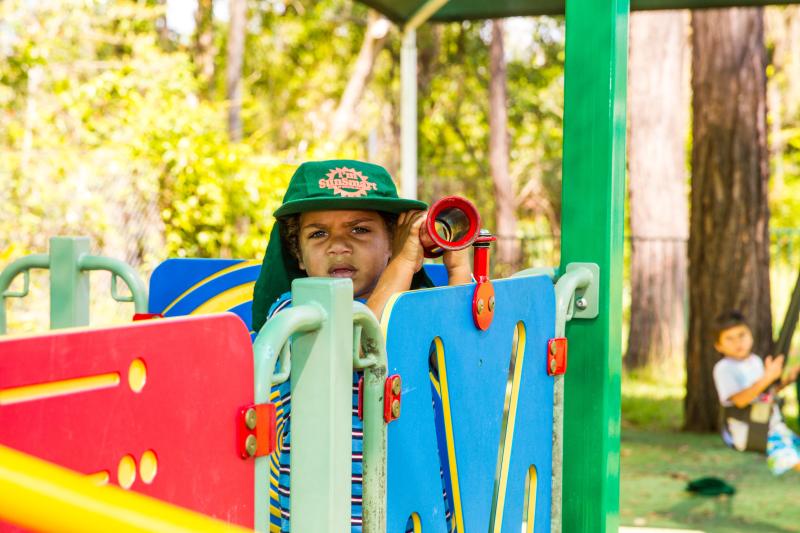Developing Narragunnawali Reconciliation Action Plans and Exceeding the National Quality Standard
- Home
- Latest news
- We hear you
- Developing Narragunnawali Reconciliation Action Plans and Exceeding the National Quality Standard
Reconciliation Action Plans (RAPs) are formal statements of commitment to reconciliation that provide a framework for actively valuing Aboriginal and Torres Strait Islander histories, cultures and contributions. But how can your service’s RAP also allow you to effectively engage with the National Quality Standard (NQS) and the three Exceeding NQS themes? Reconciliation Australia talks to We Hear You about a number of approaches and strategies.

One of the six guiding principles of the National Quality Framework (NQF) is that Australia’s Aboriginal and Torres Strait Islander cultures are valued within and across children’s education and care environments.
New guidance on determining the Exceeding National Quality Standard (NQS) rating provides scope for this principle to be holistically embedded and meaningfully informed by critical reflection and family and/or community engagement.
Reconciliation Australia’s Narragunnawali: Reconciliation in Schools and Early Learning program was developed precisely to support educational environments to foster a higher level of knowledge and pride in Aboriginal and Torres Strait Islander histories, cultures and contributions. The Narragunnawali online platform is free to access and has a range of features – including an extensive suite of professional learning and curriculum resources – to support the development, implementation and management of Reconciliation Action Plans (RAPs). Narragunnawali RAPs provide early learning and outside school hours care services, as well as primary and secondary school communities, with a practical framework for action and for driving positive, whole-scale change.
There are 39 RAP Actions that you can choose to commit to, each with accompanying information and resources to guide learning, planning and implementation processes. How your service engages with each of the RAP Actions may also be a way to demonstrate Exceeding NQS practice and the Exceeding NQS themes. [youtube https://www.youtube.com/watch?v=E2WFUZxOug0]
Theme 1: Practice is embedded in service operations
Institutional integrity represents one of the five integral and interrelated dimensions of reconciliation in Australia. As such, the Narragunnawali RAP framework provides a holistic and whole-scale framework for fostering relationships, respect and opportunities not only in the school classroom but also education and care services and with the community. Enacting institutional integrity by committing to reconciliation initiatives within teaching, learning and curricula, as part of the wider ethos within the service gates as well as across community links beyond the service gates helps ensure reconciliation is everyone’s business and for everyone’s benefit. In so doing, it provides a practical platform for demonstrating everyday, embedded practice. Exploring and engaging with the range of Narragunnawali RAP Actions can support your whole-of-service approach to reconciliation, with each Action contributing to the development of strong relationships, respect and opportunities in and around education and care services, schools and with the community.
Theme 2: Practice is informed by critical reflection
Critical reflection is a core and consistent component of developing and implementing a Narragunnawali RAP. One of the first steps in commencing or refreshing a Narragunnawali RAP involves responding to an internal Reflection Survey. The Reflection Survey is designed to provide a snapshot of the current state of reconciliation within your individual service and, in turn, guide careful and critical thinking around the next most meaningful steps in your service’s reconciliation journey. Beyond the Reflection Survey, educators can continue to engage in ongoing critical reflection through accessing the suite of Action-aligned professional learning resources available on the Narragunnawali platform. A couple of examples include:
- Reflecting on our Cultural Identities
- Community Engagement Reflection
- Reflective Journey: Working with the National Quality Standard
Critical learning and reflection at the professional level are important steps toward informing and inspiring good practice with children. For example, developing an awareness of the importance of critical evaluation among educators and staff can ultimately effect curriculum planning, resourcing and practice in non-tokenistic, culturally safe and contextually responsive ways. You can browse the full suite of professional learning and curriculum resources on the Narragunnawali platform to stimulate critical reflection and complement your RAP development/implementation process:
Theme 3: Practice is shaped by meaningful engagement with families and/or the community
‘Relationships’ represent one of the three fundamental pillars of the RAP framework and building relationships with community is one of the 14 minimally required RAP Actions necessary for driving change in a whole-scale sense. Working relationships between children’s education and care services and local Aboriginal and Torres Strait Islander families and community members should be built on trust, mutual respect and inclusiveness. Communication, collaboration and consultation are also key to establishing and extending successful transformational relationships rather than short-term ‘transactional’ relationships. For guidance on demonstrating meaningful engagement with families and/or the community, see:
As well as meaningfully engaging with your local community, educators can meaningfully engage with a national community of practice, dedicated to driving reconciliation action, by signing up to Narragunnawali, sharing news stories, and exchanging learnings and inspiration through actively exploring features such as the Narragunnawali Awards page, Webinar program and interactive Who has a RAP? map. [youtube https://www.youtube.com/watch?v=Epk448g0p-M]
Are you committed to advancing reconciliation in education, all the while Exceeding the National Quality Standard?
Head to the Narragunnawali platform to learn more!
Narragunnawali (pronounced narra-gunna-wally) is a word from the language of the Ngunnawal people, Traditional Owners of the land on which Reconciliation Australia’s Canberra office is located, meaning alive, wellbeing, coming together and peace. We are very grateful to the United Ngunnawal Elders Council for giving us permission to use the word Narragunnawali.
Leave a comment